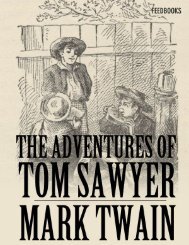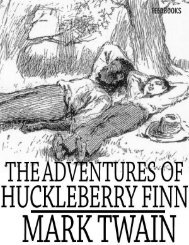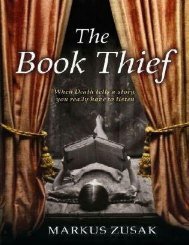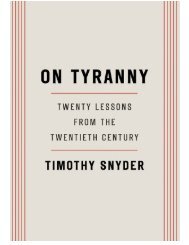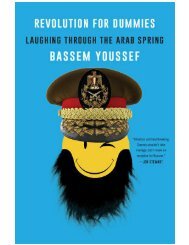Create successful ePaper yourself
Turn your PDF publications into a flip-book with our unique Google optimized e-Paper software.
originally from Kandahar and are one of the biggest Pashtun tribes, spread across Pakistan and<br />
Afghanistan.<br />
Our ancestors came to Swat in the sixteenth century from Kabul, where they had helped a Timurid<br />
emperor win back his throne after his own tribe removed him. The emperor rewarded them with<br />
important positions in the court and army, but his friends and relatives warned him that the Yousafzai<br />
were becoming so powerful they would overthrow him. So one night he invited all the chiefs to a<br />
banquet and set his men on them while they were eating. Around 600 chiefs were massacred. Only<br />
two escaped, and they fled to Peshawar along with their tribesmen. After some time they went to visit<br />
some tribes in Swat to win their support so they could return to Afghanistan. But they were so<br />
captivated by the beauty of Swat they instead decided to stay there and forced the other tribes out.<br />
The Yousafzai divided up all the land among the male members of the tribe. It was a peculiar<br />
system called wesh under which every five or ten years all the families would swap villages and<br />
redistribute the land of the new village among the men so that everyone had the chance to work on<br />
good as well as bad land. It was thought this would then keep rival clans from fighting. Villages were<br />
ruled by khans, and the common people, craftsmen and labourers, were their tenants. They had to pay<br />
them rent in kind, usually a share of their crop. They also had to help the khans form a militia by<br />
providing an armed man for every small plot of land. Each khan kept hundreds of armed men both for<br />
feuds and to raid and loot other villages.<br />
As the Yousafzai in Swat had no ruler, there were constant feuds between the khans and even<br />
within their own families. Our men all have rifles, though these days they don’t walk around with<br />
them like they do in other Pashtun areas, and my great-grandfather used to tell stories of gun battles<br />
when he was a boy. In the early part of the last century they became worried about being taken over<br />
by the British, who by then controlled most of the surrounding lands. They were also tired of the<br />
endless bloodshed. So they decided to try and find an impartial man to rule the whole area and<br />
resolve their disputes.<br />
After a couple of rulers who did not work out, in 1917 the chiefs settled on a man called Miangul<br />
Abdul Wadood as their king. We know him affectionately as Badshah Sahib, and though he was<br />
completely illiterate, he managed to bring peace to the valley. Taking a rifle away from a Pashtun is<br />
like taking away his life, so he could not disarm the tribes. Instead he built forts on mountains all<br />
across Swat and created an army. He was recognised by the British as the head of state in 1926 and<br />
installed as wali, which is our word for ruler. He set up the first telephone system and built the first<br />
primary school and ended the wesh system because the constant moving between villages meant no<br />
one could sell land or had any incentive to build better houses or plant fruit trees.<br />
In 1949, two years after the creation of Pakistan, he abdicated in favour of his elder son Miangul<br />
Abdul Haq Jehanzeb. My father always says, ‘While Badshah Sahib brought peace, his son brought<br />
prosperity.’ We think of Jehanzeb’s reign as a golden period in our history. He had studied in a British<br />
school in Peshawar, and perhaps because his own father was illiterate he was passionate about<br />
schools and built many, as well as hospitals and roads. In the 1950s he ended the system where<br />
people paid taxes to the khans. But there was no freedom of expression, and if anyone criticised the<br />
wali, they could be expelled from the valley. In 1969, the year my father was born, the wali gave up<br />
power and we became part of Pakistan’s North-West Frontier Province, which a few years ago<br />
changed its name to Khyber Pakhtunkhwa.<br />
So I was born a proud daughter of Pakistan, though like all Swatis I thought of myself first as Swati









